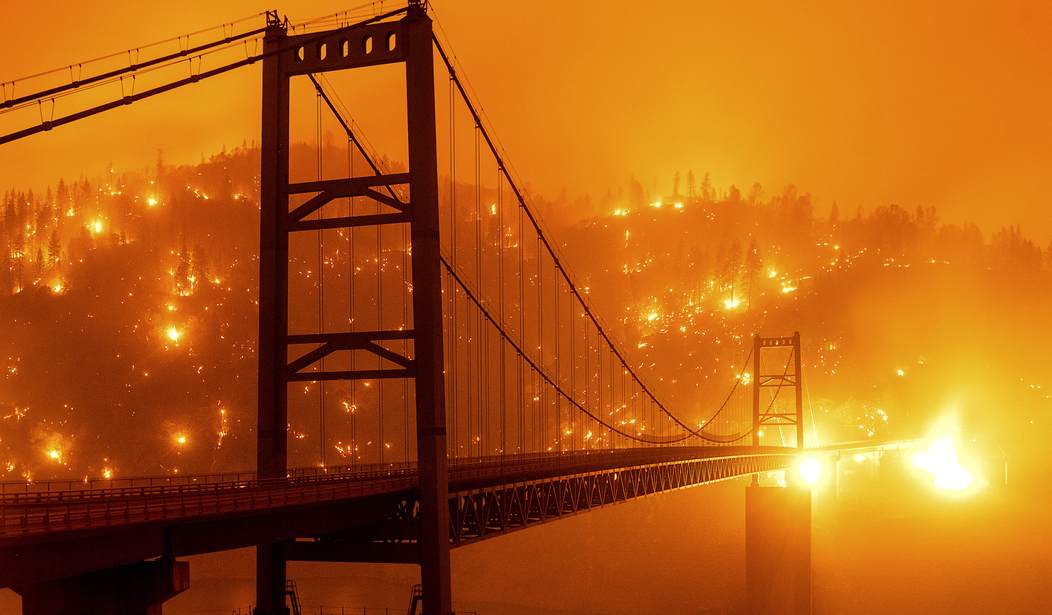Most conservatives are well aware that narratives are shaped just as much by what's reported as what's omitted. Fox News's Jesse Watters had a recent segment discussing this regarding the latest COVID-19 fearmongering going on. Instead of giving Americans the context – that rising numbers correlate to seasonal patterns – mainstream media outlets keep viewers in the dark, bombarding them with warnings about the latest "mutant variant."
The same is true about many of the reports relating to the Maui wildfires. The Associated Press, PBS, The New York Times, and Bloomberg all point the finger at climate change.
Is that really true? Most conservatives are well aware by now that other factors are more likely to blame for wildfires, like poor forest management, though in the Aloha State, Hawaiian Electric power lines, incompetence, and even water "equity" concerns played a role, as Matt has written about extensively. But these details are often left out or minimized in reports about wildfires, as one "climate scientist" has now confessed.
In a lengthy post coming clean about his misdeed, Patrick Brown, co-director of the Climate and Energy Team at The Breakthrough Institute, explains why he hyped up climate change's role in wildfires to get his paper published in Nature magazine.
In the paper, "Climate warming increases extreme daily wildfire growth risk in California," Brown says he knew not to focus on other aspects involved in the fires besides climate change since doing so would "dilute the story" such journals are looking for.
Recommended
These scientists rely on getting published in prestigious journals because it's how they advance their careers in academia – and they know for certain that only "preapproved narratives" will fly.
In theory, scientific research should prize curiosity, dispassionate objectivity, and a commitment to uncovering the truth. Surely those are the qualities that editors of scientific journals should value.
In reality, though, the biases of the editors (and the reviewers they call upon to evaluate submissions) exert a major influence on the collective output of entire fields. They select what gets published from a large pool of entries, and in doing so, they also shape how research is conducted more broadly. Savvy researchers tailor their studies to maximize the likelihood that their work is accepted. I know this because I am one of them.
Here’s how it works.
The first thing the astute climate researcher knows is that his or her work should support the mainstream narrative—namely, that the effects of climate change are both pervasive and catastrophic and that the primary way to deal with them is not by employing practical adaptation measures like stronger, more resilient infrastructure, better zoning and building codes, more air conditioning—or in the case of wildfires, better forest management or undergrounding power lines—but through policies like the Inflation Reduction Act, aimed at reducing greenhouse gas emissions.
So in my recent Nature paper, which I authored with seven others, I focused narrowly on the influence of climate change on extreme wildfire behavior. Make no mistake: that influence is very real. But there are also other factors that can be just as or more important, such as poor forest management and the increasing number of people who start wildfires either accidentally or purposely. (A startling fact: over 80 percent of wildfires in the US are ignited by humans.) [...]
This leads to a second unspoken rule in writing a successful climate paper. The authors should ignore—or at least downplay—practical actions that can counter the impact of climate change. If deaths due to extreme heat are decreasing and crop yields are increasing, then it stands to reason that we can overcome some major negative effects of climate change. Shouldn’t we then study how we have been able to achieve success so that we can facilitate more of it? Of course we should. But studying solutions rather than focusing on problems is simply not going to rouse the public—or the press. [...]
Here’s a third trick: be sure to focus on metrics that will generate the most eye-popping numbers. Our paper, for instance, could have focused on a simple, intuitive metric like the number of additional acres that burned or the increase in intensity of wildfires because of climate change. Instead, we followed the common practice of looking at the change in risk of an extreme event—in our case, the increased risk of wildfires burning more than 10,000 acres in a single day.
This is a far less intuitive metric that is more difficult to translate into actionable information. So why is this more complicated and less useful kind of metric so common? Because it generally produces larger factors of increase than other calculations. To wit: you get bigger numbers that justify the importance of your work, its rightful place in Nature or Science, and widespread media coverage. (The Free Press)
None of this is surprising, of course, but it does serve as a reminder that the next time you see attention-grabbing headlines about climate change, you'll have to do the heavy lifting yourself to determine the truth because mainstream media abdicated that responsibility long ago.

























